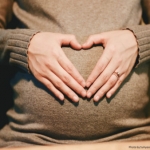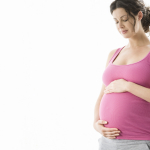Hypertension in pregnancy is generally defined as a diastolic blood pressure of 90 mm Hg or greater or a systolic pressure at or above 140 mm Hg. Preeclampsia is defined as the development of hypertension along with proteinuria or edema during pregnancy, generally in the second half of gestation. Preeclampsia is more common in women who have not carried a previous pregnancy beyond 20 weeks and in women at either extreme of their reproductive years.
Exactly what causes preeclampsia is not fully understood. Because serotonin plays a role in vascular function and the regulation of blood pressure, some have questioned whether the use of serotonin reuptake inhibitor (SRI) antidepressants may affect a woman’s risk for hypertension or preeclampsia. While several observational studies have indicated an increased risk of hypertension and/or preeclampsia in women taking SRIs during pregnancy, this finding is not consistent, and most of these studies have been small and have not been able to account for potential confounding factors.
Meta-Analysis: SSRIs and Risk for Hypertension and Preeclampsia
To better estimate the risk of gestational hypertension and preeclampsia in women taking SSRI antidepressants during pregnancy, Gumusoglu and colleagues conducted a meta-analysis of observational cohort or population studies of women who used SSRIs during pregnancy, selecting studies that specifically addressed the question of whether gestational SSRI use modulates risk of preeclampsia and/or gestational hypertension. The final analysis included nine studies published between 2009 and 2020, including approximately 40,000 SSRI-exposed pregnancies.
Among the nine included studies, two evaluated risk of gestational hypertension and seven evaluated risk of preeclampsia. Of the nine studies assessed, three reported a statistically significant increase in risk of gestational hypertension or preeclampsia in SSRI-exposed pregnancies. Four studies reported a non-significant increase in risk of preeclampsia or gestational hypertension with SSRI use during pregnancy. The pooled relative risk (RR) of gestational hypertension or preeclampsia was 1.43 (95 % CI: 1.15–1.78, P < 0.001).
While this meta-analysis does show a small, statistically significant association between prenatal SSRI exposure and risk of gestational hypertension or preeclampsia, the authors note some important limitations of this meta-analysis. Most importantly, most of the studies included in the meta-analysis failed to account for anxiety/depression severity, SSRI dose, and/or other well-defined preeclampsia risk factors (e.g., obesity, diabetes, smoking, race). The most common limitation of the included studies was the failure to account for anxiety/depression severity in the mother, which may independently drive risk for gestational hypertension and/or preeclampsia.
The Link Between Depression and Preeclampsia
Gumusoglu and colleagues note that women who use SSRIs in pregnancy may have increased risk for preeclampsia simply because they also have more severe depressive illness, which has been identified as an independent preeclampsia risk factor in other studies (Qiu et al, 2007). In fact, they note that when specific dimensions of maternal mental health are accounted for, the relative risk for preeclampsia among SSRI users is not significant, as observed in the study from Palmsten and colleagues (RR 1.16, 95 % CI 0.92–1.45). Similarly, after accounting for lifetime major depressive episodes, SSRI use in early and mid-pregnancy does not significantly increase preeclampsia risk (Lupattelli et al, 2017). Making the analysis of this association even more complicated is the fact that several preeclampsia risk factors (including obesity, metabolic syndrome, and cardiovascular disease) are more common in women with depression.
Is it Possible that SSRIs May Actually Decrease Risk for Preeclampsia
While this meta-analysis does show a small, statistically significant association between prenatal SSRI exposure and risk of gestational hypertension or preeclampsia, there are important limitations to consider. Most studies fail to account for well-defined preeclampsia risk factors (e.g., obesity, diabetes, smoking, race). Furthermore, there is increasing evidence to indicate that anxiety and/or depression in the mother may independently drive risk for gestational hypertension and/or preeclampsia.
It is biologically plausible that SRIs may actually decrease risk for preeclampsia. Both depression and preeclampsia are associated with dysregulation of serotonergic neurotransmitter systems; thus, it is plausible that medications, such as SRI antidepressants, that improve serotonergic regulation may also help to decrease depressive symptoms, as well as decrease vulnerability to preeclampsia. In an upcoming post, we will discuss a preliminary study that supports this hypothesis. Stay tuned.
While future studies will help to clarify the complex interaction between depression, SSRI treatment and pre-eclampsia, the information we have thus far is reassuring. If there is a risk of preeclampsia associated with SSRI treatment, the risk appears to be relatively small. However, there is considerable data to indicate that risk of preeclampsia is higher in women with depressive illness (even in the absence of treatment with an SSRI) and may be affected by other co-occurring risk factors, such as obesity, chronic hypertension, diabetes mellitus, and smoking.
Ruta Nonacs, MD PhD
References
Lupattelli A, Wood M, Lapane K, Spigset O, Nordeng H. Risk of preeclampsia after gestational exposure to selective serotonin reuptake inhibitors and other antidepressants: A study from The Norwegian Mother and Child Cohort Study. Pharmacoepidemiol Drug Saf. 2017 Oct; 26(10):1266-1276.
Palmsten K, Setoguchi S, Margulis AV, Patrick AR, Hernández-Díaz S. Elevated risk of preeclampsia in pregnant women with depression: depression or antidepressants? Am J Epidemiol. 2012 May 15;175(10):988-97.
Qiu C, Sanchez SE, Lam N, Garcia P, Williams MA: Associations of depression and depressive symptoms with preeclampsia: results from a Peruvian case-control study. BMC Womens Health 2007; 7:15.







Leave A Comment